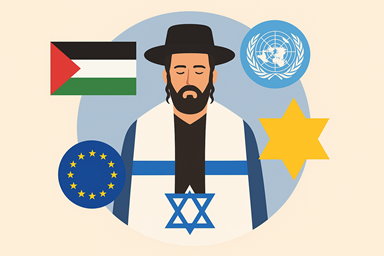By Ron Raskin

There is much debate over whether the current wave of hate against Jews and Israelis is truly antisemitism or simply anti-Israelism. Let me try to bring some order to this discussion.
First, politicians always prefer simple messages for the public—for example, “Free Palestine” slogan, as if the one and only reason for this war is that Palestinians are fighting for freedom and independence. On the opposite side, we hear the label “antisemitism” applied to anyone who raises claims against Israel. Both, of course, are oversimplifications. To understand the real nature of this hate, we need to break down its components:
- Old-style antisemitism. This mainly exists on the far right in Europe and North America among people who still believe that the genetics of ethnic groups determine social structures and morality.
- Anti-Zionism. On the opposite side of the political spectrum, you find anti-Zionists who view Israel as a colonial state. This is often mixed with Islamic/Arab/Palestinian antisemitism, rooted in religious beliefs and wounded national pride over “losing” the land they once conquered.
- Israeli Government Criticism . Perhaps the most disturbing of all, this comes from the political center in Europe. Officially, it is framed as opposition to the policies of the Israeli government. Unofficially, however, it hides a much deeper problem: Europe’s own security is threatened by growing Islamism, and Israel has become a unifying force for Islamists, the force based on one of the strongest emotions: hate.. For Europeans, it would be much easier if Israel simply disappeared—or at least kept a far lower profile. But this, of course, is incompatible with Israel’s own interests and security.
Now, let’s see how these components combine into the current wave of hate.
Israel is a democracy, and its government represents a significant portion of its population. This means that criticism of the Israeli government often also translates into being anti-Israeli and undermines the Jewish right to self-determination—which is, in turn, the cornerstone of Zionism. Thus, being anti-Israeli also implies, beyond a certain threshold, being anti-Zionist. And when the strategic disagreement between Europe and Israel centers on the very existence of the State of Israel and of Zionism itself, you can decide for yourself whether that threshold has been crossed. How it looks like in practice? Numerical examples of Israelis being attacked or simply thrown out of restaurants across the Europe, just for being Israeli. Here is one of the latest in the long line: 150 Israeli children barred from zipline park in France. How are children relevant to Criticism of the Israeli Government?
It’s important to remember that Zionism was a direct response to European antisemitism in the 19th century. Just as killings of Trayvon Martin was a catalyst for Black Lives Matter movement, Dreyfus Affair became a catalyst for Zionism. And just as opposing the rights of Black people is racism, opposing the rights of Jewish people to self-determination is, essentially, antisemitism.
To sum up: Are all three forms of hate the same? No. But there is significant overlap among these three “flavors” of hatred. And in a world where people prefer simple slogans, all these attitudes may be branded as antisemitism, anti-Zionism, or Israel Government Criticism —depending on the agenda they are meant to serve. For most Jews, all of them are experienced in the same way: as hate.

